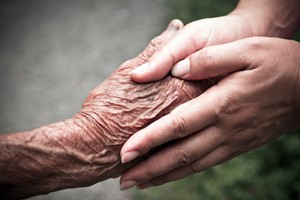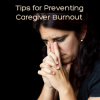Pouring your time and energy into any stressful activity is bound to cause what’s known as “burnout.” Early Bird Alert explained that this is actually a medical occurrence, which health professionals define as a psychological condition that can be debilitating, usually caused by large amounts of unrelieved stress. When caring for the elderly, a number of factors can contribute to caregiver burnout. Maria Shriver explained that because people looking after seniors are emotionally, financially and physically invested in the caregiving process, they are at a very high risk for developing burnout.
As a caregiver, you can’t afford to experience burnout, because it may cause you to slack off or quit your duties, which could negatively impact your loved one’s quality of life. Be vigilant about monitoring your fatigue and stress levels so you can continue providing for your aging relative.
Recognize the signs of burnout
You might not realize you’re spreading yourself too thin until it’s too late. Friendship Circle explained that there are some tell-tale signs when it comes to identifying burnout, and they often mimic those associated with depression and post-traumatic stress disorder.
- Losing patience or becoming easily irritated.
- Social withdrawal.
- Increased use of alcohol or other substances to self-medicate.
- Decreased physical and emotional energy.
- Losing interest in hobbies.
- Decreased immunity to disease.
- Thoughts of self-harm.
- Feeling of numbness or lack of emotion.
- Difficulty concentrating.
- Having a hard time sleeping.
- Noticeable changes in appetite and/or weight.
The effects of burnout
While you might think you can push through burnout, it’s often crippling and may have a significant impact on your life. Friendship Circle explained that because it can cause caregivers to withdraw and develop feelings of apathy, it can put both their health and the health of their elderly loved ones at risk. If you feel like you might be heading toward burnout, or that you’re already in the midst of this experience, there are a number of things you can do to pull yourself and your aging relative out of this potentially harmful situation.
Prevent and recover from burnout
Don’t let burnout consume and distract you. Be proactive about improving your mental and physical health with these five helpful tips.
1. Find a support group
It can be intimidating to reach out to strangers for comfort and help, but support groups are a great way to feel understood and encouraged. Early Bird Alert suggests doing a quick Internet search to figure out where caregiver support groups meet in your area. They’re most likely associated with community organizations, assisted living centers or hospitals.
2. See a doctor
As a caregiver, your main priority is taking care of someone else, which often means you forget to look after your own health. Friendship Circle noted that making regular appointments with your doctor and letting him or her know the details of your situation can go a long way toward preventing burnout. Your physician can check for burnout-related illnesses and offer stress-relief advice specific to your life.
“It’s important to set boundaries.”

- Because people looking after seniors are emotionally, financially and physically invested in the caregiving process, they are at a very high risk for developing burnout.
3. Set limits
While taking care of someone else can consume a large portion of your life, it’s important that you don’t let it eclipse the entire thing. Although devoting all your time and energy to your loved one might seem like the responsible thing to do, this will actually make you less efficient in the long run. It’s important to create boundaries and say “no” occasionally when it comes to certain caregiving duties and outside opportunities. Remind yourself that you don’t need to take on every task, and that you can’t fix every problem.
4. Adopt personal rituals
According to Friendship Circle, performing daily rituals can calm your mind and comfort you. If you’re religious, consider incorporating your beliefs into your routines, since this can be a wonderful source of peace and support. Consider bringing nonreligious rituals into your day as well, such as carving out half an hour each morning to have a cup of coffee and relax before starting the day, or making a list of things that you’re grateful for over lunch. Try purchasing a book of inspirational stories and poems and reading a page from it each night before bed. These actions, though small, can go a long way toward motivating you and promoting good self-care. Additionally, be sure to reserve time for your hobbies. Early Bird Alert noted that giving up the activities that make you happy can expedite the burnout process and leave you feeling lonely. If you’ve always been a mountain biker who listens to jazz, don’t stop participating in these interests! You may have to readjust your schedule – mountain bike on the weekends when you can enlist friends and family to cover caretaker duties, or play jazz throughout the day instead of going to your favorite club at night. Figure out a way to incorporate these pleasures into your new lifestyle.
5. Talk to friends and family
If you’re having a hard time, there’s nothing quite like venting to a loved one you trust. While support groups are excellent resources that can allow you to share issues anonymously and set you up with coping tools, talking to people who know intimate details about your situation can help you work through a lot of stress. If you keep your emotions bottled up inside, they’re bound to explode, so take time to call friends and family members who know you very well and can offer you advice.
If you found an error, highlight it and press Shift + Enter or click here to inform us.



